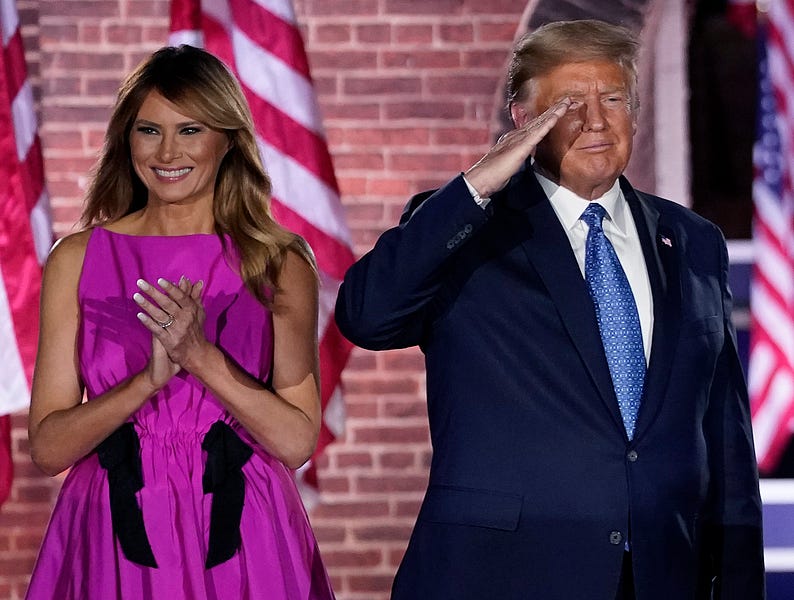The party conventions are over—and I don’t just mean the 2020 conventions.
In one sense, the conventions have been over for a very long time. They were created primarily to do two things: pick presidential nominees and craft party platforms. A convention hasn’t actually picked a nominee since 1952, when Democrat Adlai Stevenson won the nomination on the third ballot.
Since then, conventions have mostly just approved nominees as foregone conclusions on the first ballot. Ever since the rise of primaries in the early 1970s, the nominee is literally chosen before the convention. All that’s left is the coronation.
But at least conventions still crafted party platforms. These are statements of principle and policy, hammered out between different factions within a party, to state clearly (or sometimes murkily) what the party stands for. Historically, platform fights could matter enormously. It was through the negotiation of the platform that a party decided where it came down on issues such as slavery and prohibition.
The other practical benefit? The platform also gave marching orders to the nominee. It was part mission statement, part job description. Its overall purpose was to say, “This is what the party expects from you,” because the nominee was selected to do the job the party wanted. Of course, in reality, if the nominee were elected president, he could ignore the platform. Still, the principle that the party and its elected officials were bound to the platform had some juice in it.
That’s gone. In advance of the GOP convention this week, the Republican National Committee announced that, for the first time in the history of either major political party, it wasn’t going to bother writing a new platform. (Technically, the party decided in June to recycle the 2016 platform, outdated cover and all.)
“The RNC enthusiastically supports President Trump and continues to reject the policy positions of the Obama-Biden administration, as well as those espoused by the Democratic National Committee today,” the committee declared in a resolution.
Later, a list of soundbite promises with no policy specifics was released to describe President Trump’s second-term agenda. My favorite: “Drain the Globalist Swamp by Taking on International Organizations That Hurt American Citizens.”
Regardless, the point was clear. The party is now the servant of the nominee—in this case, the president. Hence a platform is truly pointless because the party stands for nothing other than whatever the president says it does.
There’s a third role for conventions—one that would appear to be the most obvious, in a hiding-in-plain-sight sense. Conventions are meant to CONVENE. It’s in the name. Party members from across the country travel to meet face-to-face to work, negotiate and socialize together for an organization larger than themselves. Again, such work used to include actually picking a nominee, but the primary system and modern communications destroyed that. Before the invention of the telephone, as historian and political analyst Michael Barone has noted, conventions were a necessary political technology because one couldn’t negotiate by mail. It was too slow, and power brokers didn’t want to put things on paper anyway.
Long before the pandemic, conventions had been turning into tightly scripted partisan infomercials for the coming election. Make of that what you will, but at least people still convened. They put on their silly hats, they wore their flare, and they had discussions and debates in the moments when they weren’t being used as the political equivalent of a studio audience in a ShamWow ad.
That’s gone this year, too. COVID-19 erased even the conventional part of the conventions. That made them seem like a break with the past—the first “virtual” conventions. But the reality is that they’ve been mostly virtual—conventions in name only—for a long time already. This month’s highly produced nightly videos with staged bits of spontaneity (just like the Oscars or Emmys) were the fulfillment of trends long in the making. The parties are paper-tiger marketing firms now, geared to bend their brand to whichever politician happens to win the nomination or hold power for their team.
People will show up for conventions again, but the GOP’s convention in particular makes it clear that when they do, it will be as props and applause machines only.
Photograph by Drew Angerer/Getty Images.







Please note that we at The Dispatch hold ourselves, our work, and our commenters to a higher standard than other places on the internet. We welcome comments that foster genuine debate or discussion—including comments critical of us or our work—but responses that include ad hominem attacks on fellow Dispatch members or are intended to stoke fear and anger may be moderated.
You are currently using a limited time guest pass and do not have access to commenting. Consider subscribing to join the conversation.
With your membership, you only have the ability to comment on The Morning Dispatch articles. Consider upgrading to join the conversation everywhere.